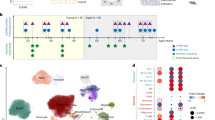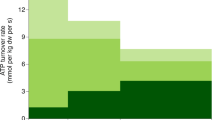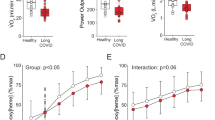Abstract
Background
Cancer and its treatments often lead to sarcopenia and fatigue. However, whether these factors are associated remains unproven.
Objective
To evaluate whether the risk of sarcopenia predicts the presence of fatigue.
Methods
A cross-sectional study was completed and included 198 cancer patients of both sexes, undergoing in- and outpatient treatment. The Strength, Assistance for walking, Rise from a chair, Climb stairs, and Falls (SARC-F) and the Functional Assessment of Cancer Therapy Fatigue (FACT-F) were used to assess the risk of sarcopenia and the presence of fatigue, respectively. The cut-off values used to identify the risk of sarcopenia and the severity of fatigue scale were SARC-F ≥ 4 and Fatigue <34, respectively. Logistic regression analysis was performed to evaluate the association between SARC-F and the FACT-F.
Results
Out of 198 patients, 35% were at risk of sarcopenia and of these 87% had fatigue. Patients at risk of sarcopenia had lower scores in the FACT-F subscales, lower handgrip strength, lower performance status, were mostly hospitalized and were sedentary. Logistic regression analysis revealed that patients with SARC-F < 4 had a lower risk of fatigue in both models, crude (OR: 0.83; CI 95% [0.79–0.88], p < 0.0001) as well as adjusted for age, gender, BMI, physical activity, current use of alcoholic beverages, smoking, performance status, cancer type, clinical setting and use of supplements (OR: 0.87; CI 95% [0.81–0.92], p < 0.0001).
Conclusion
In patients with cancer, 35% presented risk of sarcopenia and of these 87% had fatigue. In addition, the absence of sarcopenia was considered protective against fatigue.
This is a preview of subscription content, access via your institution
Access options
Subscribe to this journal
Receive 12 print issues and online access
$259.00 per year
only $21.58 per issue
Buy this article
- Purchase on Springer Link
- Instant access to full article PDF
Prices may be subject to local taxes which are calculated during checkout
Similar content being viewed by others
References
Cruz-Jentoft AJ, Bahat G, Bauer J, Boirie Y, Bruyère O, Cederholm T, et al. Sarcopenia: Revised European consensus on definition and diagnosis. Age Ageing. 2019;48:16–31.
Borges TC, Gomes TLN, Pimentel GD. Sarcopenia as a predictor of nutritional status and comorbidities in hospitalized patients with cancer: A cross-sectional study. Nutr. 2020;73:110703.
Pamoukdjian F, Bouillet T, Lévy V, Soussan M, Zelek L, Paillaud E. Prevalence and predictive value of pre-therapeutic sarcopenia in cancer patients: a systematic review. Clin Nutr. 2018;37:1101–13.
Soares JDP, Gomes TLN, Siqueira JM, Oliveira ICL, Mota JF, Laviano A, et al. Muscle function loss is associated with anxiety in patients with gastrointestinal cancer. Clin Nutr ESPEN. 2019;29:149–53.
Dela VegaMCM, Laviano A, Pimentel GD. Sarcopenia and chemotherapy-mediated toxicity. Einstein. 2016;14:580–4.
Malmstrom TK, Morley JE. SARC-F: a simple questionnaire to rapidly diagnose sarcopenia. J Am Med Dir Assoc. 2013;14:531–2.
Barbosa-Silva TG, Menezes AMB, Bielemann RM, Malmstrom TK, Gonzalez MC. Enhancing SARC-F: Improving sarcopenia screening in the clinical practice. J Am Med Dir Assoc. 2016;17:1136–41.
Fu X, Tian Z, Thapa S, Sun H, Wen S, Xiong H. et al. Comparing SARC-F with SARC-CalF for screening sarcopenia in advanced cancer patients. Clin Nutr. 2020;39:3337–45.
Behne TEG, Dock-Nasimento DB, Sierra JC, Ro-Drigues HHNP, Palauro ML, Andreo FO. et al. Association between preoperative potential sarcopenia and survival of cancer patients undergoing major surgical procedures. Rev Col Bras Cir. 2020;47:1–10.
Berger AM, Mooney K, Alvarez-Perez A, Breitbart WS, Carpenter KM, Cella D, et al. Cancer-Related Fatigue, Version 2.2015: Clinical Practice Guidelines in Oncology. J Natl Compr Canc Netw. 2015;13:1012–39.
O’Higgins CM, Brady B, O’Connor B, Walsh D, Reilly RB. The pathophysiology of cancer-related fatigue: current controversies. Support Care Cancer. 2018;26:3353–64.
Mock V, Atkinson A, Cella D, et al. National Comprehensive Cancer Network (NCCN) Practice Guidelines for Cancer-Related Fatigue. Oncology 2000;14:151–61.
Gomes TLN, Soares JDP, Borges TC, Pichard C, Pimentel GD. Phase angle is not associated with fatigue in cancer patients: the hydration impact. Eur J Clin Nutr. 2020;74:1369–73.
Ishikawa NM, Thuler LCS, Giglio AG, Da Rocha Baldotto CS, De Andrade CJC, Derchain SFM. Validation of the Portuguese version of Functional Assessment of Cancer Therapy-Fatigue (FACT-F) in Brazilian cancer patients. Support Care Cancer. 2010;18:481–90.
Van Belle S, Paridaens R, Evers G, Kerger J, Bron D, Foubert J, et al. Comparison of proposed diagnostic criteria with FACT-F and VAS for cancer-related fatigue: Proposal for use as a screening tool. Support Care Cancer. 2005;13:246–54.
Feng LR, Regan J, Shrader JA, Liwang J, Ross A, Kumar S, et al. Cognitive and motor aspects of cancer-related fatigue. Cancer Med. 2019;8:5840–9.
Wang B, Thapa S, Zhou T, Liu H, Li L, Peng GYS. Cancer-related fatigue and biochemical parameters among cancer patients with different stages of sarcopenia. Support Care Cancer. 2019;28:581–8.
Schag CC, Heinrich RL, Ganz PA. Karnofsky performance status revisited: Reliability, validity, and guidelines. J Clin Oncol. 1984;2:187–93.
Yang M, Huang Z, Chen J, Jiang J, Zuo Y, Hao Q. Applications of the new ESPEN definition of malnutrition and SARC-F in Chinese nursing home residents. Sci Rep. 2018;8:1–9.
Chauhan NS, Samuel SR, Meenar N, Saxena PP, Keogh JWL. Sarcopenia in male patients with head and neck cancer receiving chemoradiotherapy: a longitudinal pilot study. PeerJ 2020;8:e8617.
Noronha Barrére AP, Guimarães Lopes G, de Assis T, Fraga Piovacari SM, Toledo DO. Identification of Sarcopenia Risk in Oncology Outpatients using the SARC-F Method. J Nutr Heal Food Sci. 2018;6:1–5.
Kilgour RD, Vigano A, Trutschnigg B, Hornby L, Lucar E, Bacon SL, et al. Cancer-related fatigue: the impact of skeletal muscle mass and strength in patients with advanced cancer. J Cachexia Sarcopenia Muscle. 2010;1:177–85.
Neefjes ECW, van den Hurk RM, Blauwhoff-Buskermolen S, van der Vorst MJDL, Becker-Commissaris A, de van der Schueren MAE, et al. Muscle mass as a target to reduce fatigue in patients with advanced cancer. J Cachexia Sarcopenia Muscle. 2017;8:623–9.
Ohashi K, Ishikawa T, Hoshi A, Suzuki M, Mitobe Y, Yamada E, et al. Relationship Between Sarcopenia and Both Physical Activity and Lifestyle in Patients With Chronic Liver Disease. J Clin Med Res. 2018;10:920–7.
Queiroz M dos SC, Wiegert EVM, Lima LC, Oliveira LC de. Associação entre Sarcopenia, Estado Nutricional e Qualidade de Vida em Pacientes com Câncer Avançado em Cuidados Paliativos. Rev Bras Cancerol. 2018;64:69–75.
Nipp RD, Fuchs G, El‐Jawahri A, Mario J, Troschel FM, Greer JA, et al. Sarcopenia Is Associated with Quality of Life and Depression in Patients with Advanced Cancer. Oncologist 2018;23:97–104.
Papadopoulou SK. Sarcopenia: A contemporary health problem among older adult populations. Nutrients. 2020;12:1293.
Martone AM, Bianchi L, Abete P, Bellelli G, Bo M, Cherubini A, et al. The incidence of sarcopenia among hospitalized older patients: results from the Glisten study. J Cachexia Sarcopenia Muscle. 2017;8:907–14.
Pimentel GD, Pichard C, Laviano A, Fernandes RC. High protein diet improves the overall survival in older adults with advanced gastrointestinal cancer. Clin Nutr. 2021;40:1376–80.
Prado CM, Purcell SA, Laviano A. Nutrition interventions to treat low muscle mass in cancer. J Cachexia Sarcopenia Muscle. 2020;11:366–80.
Soares JDP, Howell SL, Teixeira FJPG. Dietary Amino Acids and Immunonutrition Supplementation in Cancer-Induced Skeletal Muscle Mass Depletion: A Mini-Review. Curr Pharm Des. 2020;9:970–8.
Acknowledgements
TCB, JDP, JSM, and TLNG would like to thank the Capes, Brazil. GDP would like to The Brazilian National Council for Scientific and Technological Development (CNPq, Brazil, 312252/2019–6).
Author information
Authors and Affiliations
Contributions
CSB, TCB, and GDP contributed to study design. CSB, TCB, NPV, TLNG, JDPS, JMS collected the data. CSB, TCB, and GDP performed the statistical analyses. CSB, TCB, and GDP drafted the manuscript. CP, AL, and GDP contributed of critical discussion of data and revised the paper. All authors read and approved the final version of the manuscript.
Corresponding author
Ethics declarations
Conflict of interest
The authors declare no competing interests.
Additional information
Publisher’s note Springer Nature remains neutral with regard to jurisdictional claims in published maps and institutional affiliations.
Rights and permissions
About this article
Cite this article
Barreto, C.S., Borges, T.C., Valentino, N.P. et al. Absence of risk of sarcopenia protects cancer patients from fatigue. Eur J Clin Nutr 76, 206–211 (2022). https://doi.org/10.1038/s41430-021-00931-4
Received:
Revised:
Accepted:
Published:
Issue Date:
DOI: https://doi.org/10.1038/s41430-021-00931-4



